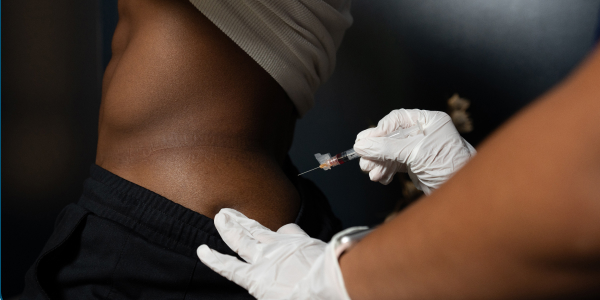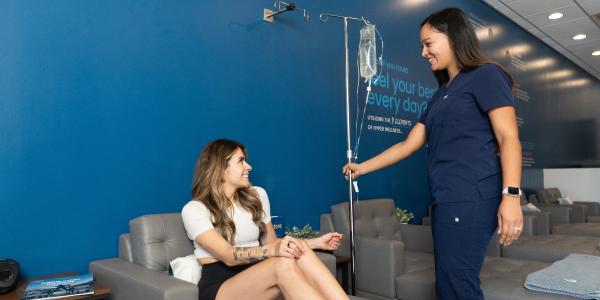Vitamin D, the sunlight vitamin, is about to become more scarce. Winter leads to more extended periods of darkness in the northern and southernmost hemispheres, and light diminishes.
As a fat-soluble vitamin, D helps our bodies retain calcium and phosphorus. This kind of mineral absorption is critical for strong bones. Vitamin D even reduces inflammation to ward off cancer and infections.
However, most vitamin D comes from sunlight. But what happens when we can't get enough?
Sunlight: Doctor's Orders
Rhonda Patrick, Ph.D. and biomedical scientist, says vitamin D is one of the best nutrients for brain health. It's a steroid hormone we produce when we are in the sun—receptors in our skin metabolize vitamin D.
Melanin affects vitamin D absorption. The darker your skin is, the less vitamin D you'll produce, even with sunlight.
3 Ways Vitamin D Affects Your Wellbeing:
- Brain Health and Serotonin
- Bone Health
- Reduces Inflammation
1. Can Vitamin D Make You Happier?
After hours spent outside or a day at the beach, most people feel pretty good. Ever since I was a little kid, I've wanted to "go outside." My body instinctively knew I'd be prone to depression, so it led me to the great outdoors.
Dr. Patrick says 70% of the U.S. population has inadequate vitamin D levels.
Vitamin D affects your DNA and gene expression. In addition, it helps with serotonin getting into your brain. Serotonin needs tryptophan hydroxylase 2 (TPH2) to cross the blood-brain barrier, which is activated by vitamin D (from sunlight). Once TPH2 is activated, serotonin can cross the blood-brain barrier with ease.
Get more vitamin D to increase the mood-boosting effects of serotonin!
2. Build Better Bones
Vitamin D increases the absorption of essential minerals, magnesium, and calcium. Calcium is crucial for building strong bones and reducing the risk of osteoporosis. In a study where people with chronic kidney disease took vitamin D3, absorption of calcium and magnesium increased to normal levels when previously they were deficient.
Breastfed infants are usually prescribed vitamin D since human breastmilk does not contain enough for adequate intake. In addition, vitamin D supplementation prevents rickets (weak or soft bones) in babies and children.
You can't have healthy bones without vitamin D.
3. Rescind Inflammation to Reduce Cell Stress
Insufficient vitamin D intake is correlated with pregnancy complications and immune dysfunction. When pregnant people took vitamin D, it reduced the risk of having children who had respiratory infections or wheezing.
Additionally, vitamin D is known for its autoimmune effects, including better mental health, especially in children. That’s because of vitamin D’s neurohormonal effects on development and behavior.
Vitamin D boosts immunity, because it reduces oxidative stress on cells. As a result, relaxed cells are inflammation-free and happy as can be.
How Much Vitamin D Should You Take Daily?
Each person's U.V. exposure needed for adequate vitamin D makes specific recommendations difficult. Absorption is dependent on skin pigmentation. Experts suggest 5-30 minutes daily of sun on the face, arms, and hands. It's beneficial to reduce U.V. exposure, a known carcinogen. However, vitamin D isn't absorbed through SPF 8 or higher. Don't ditch the sunscreen altogether!
The Normal Range/RDA (Recommended Daily Amount) for Vitamin D:
- 400 IU for children up to 12 months
- 600 IU or 15 mcg daily for adults over 19 years
- 800 IU or 20 mcg daily for adults over 70 years
The tolerable upper intake level is 4,000 IU or 100 mcg for ages nine and up. The tolerable upper intake is the maximum amount of vitamin D you can safely consume without harmful health effects.
Taking a multivitamin with vitamin D may be helpful, according to the Mayo Clinic.
Foods with Vitamin D
Sources of vitamin D come from D2 (ergocalciferol) and D3 (cholecalciferol). Both are absorbed in the small intestine. Vitamin D is also better absorbed with higher fat content in the gut.
Look to salmon and fatty fish for a food source, usually in the D3 form. Fortified cereals and milk also contain vitamin D3.
Cod liver oil, trout, salmon, mushrooms, and 2% milk are some food sources with the highest amount of vitamin D.
Remember that few foods provide vitamin D.
Getting More Sunlight
The kind of vitamin D our bodies create from sunlight is called "calciferol." Looking for the best way to get more neuroprotectant qualities of vitamin D? Sun exposure! Our bodies are the best producers of Vitamin D.
Restore IM Shots with Vitamin D3
Try supplementing with an IM shot at Restore to boost your vitamin D3. Some IV drips also come with vitamin D3. Even though sunlight is the best way to replenish your D, we know it's not always possible, especially in the winter.




%20Plans.jpg)

